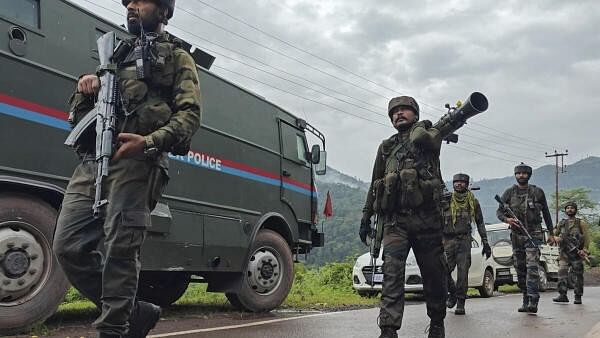
Army personnel move towards the encounter site, in Lathi village in Jammu and Kashmir's Rajouri district.
Credit: PTI Photo
Managing security challenges and relations with the elected government in volatile Jammu and Kashmir will be a major test for New Delhi after the assembly polls in the Union Territory.
Historically, the period leading up to the elections in J&K saw a surge in violence, with militant groups trying to derail the democratic process, which they perceived as a threat to their agenda. One of the primary concerns during the election period is the threat of targeted violence against candidates, party workers, and voters.
J&K police chief R R Swain assured the candidates and the voters that the security forces were committed to the peaceful conduct of assembly elections. “We overcame these challenges during the parliamentary polls (held in April-May this year),” he said, promising to do it again during the assembly polls too.
A senior police officer, however, said that while the immediate focus of the security agencies remained on ensuring a peaceful election, the post-poll security scenario would be equally crucial and challenging.
“The outcome of the elections could have far-reaching implications for the region's stability. A fractured mandate, which seems likely given the multi-cornered contest, could lead to political uncertainty and even unrest,” he said.
The officer added that the possibility of post-poll violence could not be ruled out in such a scenario, “particularly if there are allegations of electoral malpractice or if the results do not align with the expectations of certain parties and groups”.
The international community, while supportive of the democratic process in J&K, is also closely monitoring the situation, particularly in light of the region's strategic importance. Earlier this week, senior American diplomats during their visit to Srinagar met various political leaders, which clearly reveals that the West is keenly watching the developments in the UT.
Should the elections result in a regional party or a coalition securing a majority, the newly elected government will possibly push for a reversal or modification of decisions made by New Delhi in August 2019.
This could include demands for the restoration of statehood and reintroduction of certain provisions that were repealed with the abrogation of Article 370 of the Constitution of India. The central government, however, is expected to maintain a firm stance on these issues, setting the stage for a potential confrontation.
As the region moves towards this crucial electoral milestone, the eyes of the nation and the world are firmly fixed on how security concerns are managed during and after the polls.